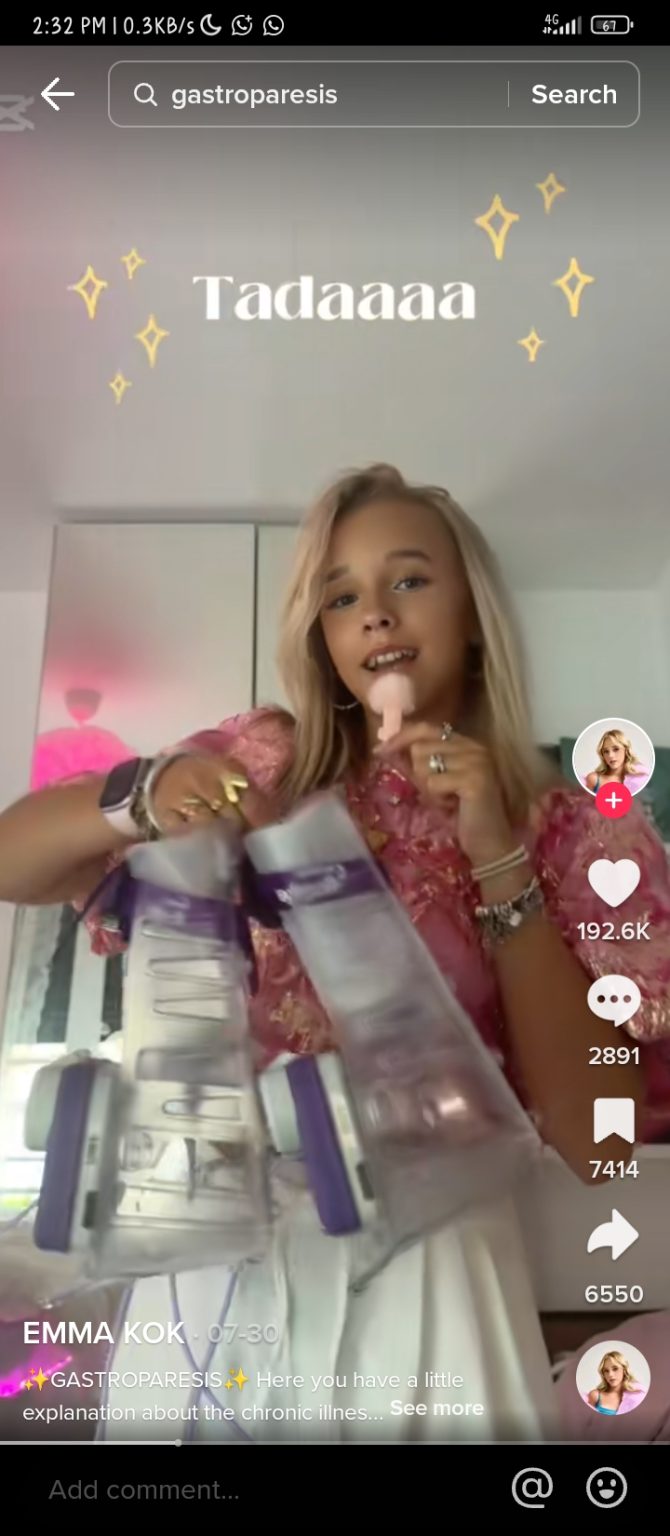A 17-year-old girl identified as Emma has drawn global attention after revealing her lifelong struggle with gastroparesis, a rare and often misunderstood medical condition that leaves her unable to eat food in the traditional sense.
Emma, who posted her story on TikTok under the username emmakok, explained that she was born without a functioning stomach and has relied on feeding tubes since infancy.
Her video, uploaded in July but gaining traction on Monday, highlights both the physical and emotional challenges of living with a condition that remains unfamiliar to many.
“Hi, my name is Emma. I am 17 and I have a chronic illness called gastroparesis. Gastroparesis simply means my stomach is paralysed, it doesn’t work. Because my stomach is paralysed, it can’t digest any food. Which also means I’m not able to eat any food and that is why I have two feeding pumps.
“These are the two, they’re for my intestines and stomach. I have had these two feeding pumps since I was a baby so I have never eaten anything in my life.”
While Emma can occasionally sip tea, water, or tiny amounts of honey, she has never tasted everyday meals such as chocolate, spaghetti, or burgers. She admitted that this makes social situations more difficult, as food plays a central role in most people’s lives.
Beyond the physical restrictions, Emma also spoke about the stigma faced by many gastroparesis patients, pointing out that their symptoms are often dismissed in medical settings. “Doctors sometimes put it down to anxiety or stress, which makes us feel ignored,” she added.
Her video ended with a plea for wider recognition of the illness: “I want to spread awareness and help others understand what living with this condition really means. Please just listen.”
Read Also: NHS to give cancer vaccines to aggressive head, neck patients
What is gastroparesis?
Cleveland Clinic defines gastroparesis as a paralysis of the stomach with a functional disorder that affects the stomach nerves and muscles.
Symptoms include indigestion, bloated stomach, feeling full very quickly or for a long time, upper abdominal pain, nausea and vomiting, and regurgitating (spitting up) whole pieces of undigested food.
Other symptoms include loss of appetite, acid reflux and heartburn, blood sugar fluctuations, and constipation.
Though treatment options—such as dietary adjustments, medications that stimulate stomach contractions, or surgical procedures—can help manage symptoms, there is currently no cure. Globally, gastroparesis remains underdiagnosed, leaving many patients feeling isolated and misunderstood.
Other patient speak out
For some who face similar challenges, Emma’s story resonated deeply, bringing hope. Her experience has since spread widely, sparking conversations online about invisible illnesses and the urgent need for greater medical awareness.
Another user, Sackarias Persson, a 48-year-old who drew strength from her story, shared how he felt after listening to Emma. He said, “I know exactly how it is. I have gastroparesis, epilepsy, and chronic kidney failure stage 5, which means no urine production. Which is very difficult because I get almost only liquid, some biscuits sometimes I can get in me.
“Like you said, you don’t get taken seriously by doctors. I have dialysis three times a week, four hours at a time. This is due to my chronic kidney failure. I’ve been like this for about 10 years, I’m 48 years old. I suffer with you.”
Another TikTok user, Aoife, responded to the question of whether they get the taste of what they eat as a gastroparesis patient: “I have gastroparesis and for me my mouth doesn’t water from the smell of food. My stomach is mostly paralysed so it doesn’t send my brain any hunger cues or signals. It’s like smelling food while being full and nauseous except for the fact that my stomach is empty. I don’t know if it’s the same for Emma though since everyone with this condition is different.”



